NEW YORK (AP) — David Wright's No. 5 will be retired by the New York Mets before a July 19 game against Cincinnati, the team said Monday.
Wright's number will be the 10th retired by the Mets, the sixth since Steve Cohen bought the team ahead of the 2021 season. Wright also will enter the team's Hall of Fame, joining Tom Seaver as the only Mets players to receive both honors on the same day.
A seven-time All-Star, Wight hit .296 with 242 homers, 970 RBIs and 196 stolen bases from 2004-18, his career cut short by neck, back and shoulder injuries that required surgery.
Wright, who turned 42 on Dec. 20, became the Mets' fourth captain in 2013 after Keith Hernandez (1987–89), Gary Carter (1988–89) and John Franco (2001–04).
“David Wright personified class on and off the field,” Mets owners Steve and Alex Cohen said in a statement. “David is the definition of a Met."
New York previously retired No. 14 (Gil Hodges, 1973), No. 16 (Dwight Gooden, 2024), No. 17 (Hernandez, 2022), No. 18 (Darryl Strawberry, 2024), No. 24 (Willie Mays, 2022), No. 31 (Mike Piazza, 2016), No. 36 (Jerry Koosman, 2021), No. 37 (Casey Stengel, 1965) and No. 41 (Seaver, 1988). In addition, Jackie Robinson’s No. 42 was retired throughout Major League Baseball in 1997.
AP MLB: https://apnews.com/

FILE - In this Sept. 30, 2018, file photo, New York Mets' David Wright returns to the dugout after an on-field ceremony during a baseball game against the Miami Marlins in New York. (AP Photo/Jason DeCrow, File)
HONG KONG (AP) — Asian markets were mostly lower on Wednesday after shares slumped on Wall Street despite better-than-expected reports on the U.S. jobs market and business activity.
U.S. futures and oil prices were higher.
Japan’s benchmark Nikkei 225 lost 0.3% to 39,981.06. The U.S. dollar was trading at 157.97 yen, down from 158.06.
Hong Kong’s Hang Seng lost 1% to 19,255.76 and the Shanghai Composite index was nearly unchanged at 3,230.17. Shares of Tencent fell 2.4%, and shares in CATL, the world’s largest battery maker, dropped 1.8%. Both companies were included in a list released by the U.S. Defense Department linking them to China’s military.
In South Korea, the Kospi jumped 1.2% to 2,521.05. Australia’s S&P/ASX 200 advanced 0.8% to 8,349.10.
On Tuesday, the S&P 500 fell 1.1% to 5,909.03 after giving up an early gain. The Dow Jones Industrial Average dropped 0.4% to 42,528.36, while the Nasdaq composite tumbled 1.9% to 19,489.68.
Stocks dropped under the weight of rising yields in the bond market, which jumped immediately after the release of the encouraging reports on the economy. One said U.S. employers were advertising more job openings at the end of November than economists expected. The other said activity for finance, retail and other services businesses grew much faster in December than expected.
The strong reports are of course good news for workers looking for jobs and for anyone worried about a possible recession that earlier seemed inevitable to pessimists. But such a solid economy could also keep up pressure on inflation, and it could make the Federal Reserve less likely to deliver the cuts to interest rates that Wall Street loves.
The Fed began cutting its main interest rate in September to give the economy a boost, but it’s hinted a slowdown in easing is coming. The threat of tariffs from President-elect Donald Trump has raised worries about possible upward pressure on inflation, which has stubbornly remained just above the Fed’s 2% target.
Tuesday’s report on U.S. services industries from the Institute for Supply Management also contained discouraging trends on inflation, saying price increases accelerated in December.
Expectations for fewer cuts to interest rates in 2025 have already been building for weeks. That sent longer-term Treasury yields upward. So have worries about other possible Trump policies, such as tax cuts, which could swell the U.S. government’s debt and likewise push yields higher.
Those higher yields make Treasury bonds more attractive to investors who might otherwise buy stocks, which in turn puts downward pressure on stock prices, and the super-safe bonds are paying notably more. The yield on a 10-year Treasury climbed to 4.69% from 4.63% shortly before the release of Tuesday’s reports and from just 4.15% in early December.
Now that worries from the summer about a potentially slowing U.S. economy have abated and the 10-year Treasury yield is firmly above 4.50%, “we believe the market is shifting into a ‘good news is bad news’ environment again,” according to Bank of America strategists led by Ohsung Kwon.
That raises the stakes for Friday’s coming update on the U.S. job market, which economists expect will show a slowdown in overall hiring. They’re looking for growth of 156,500 jobs in December, according to FactSet.
In energy trading, benchmark U.S. crude added 42 cents to $74.67 a barrel. Brent crude, the international standard, rose 41 cents to $77.46 a barrel.
In currency trading, the euro cost $1.0346, up from $1.0341.
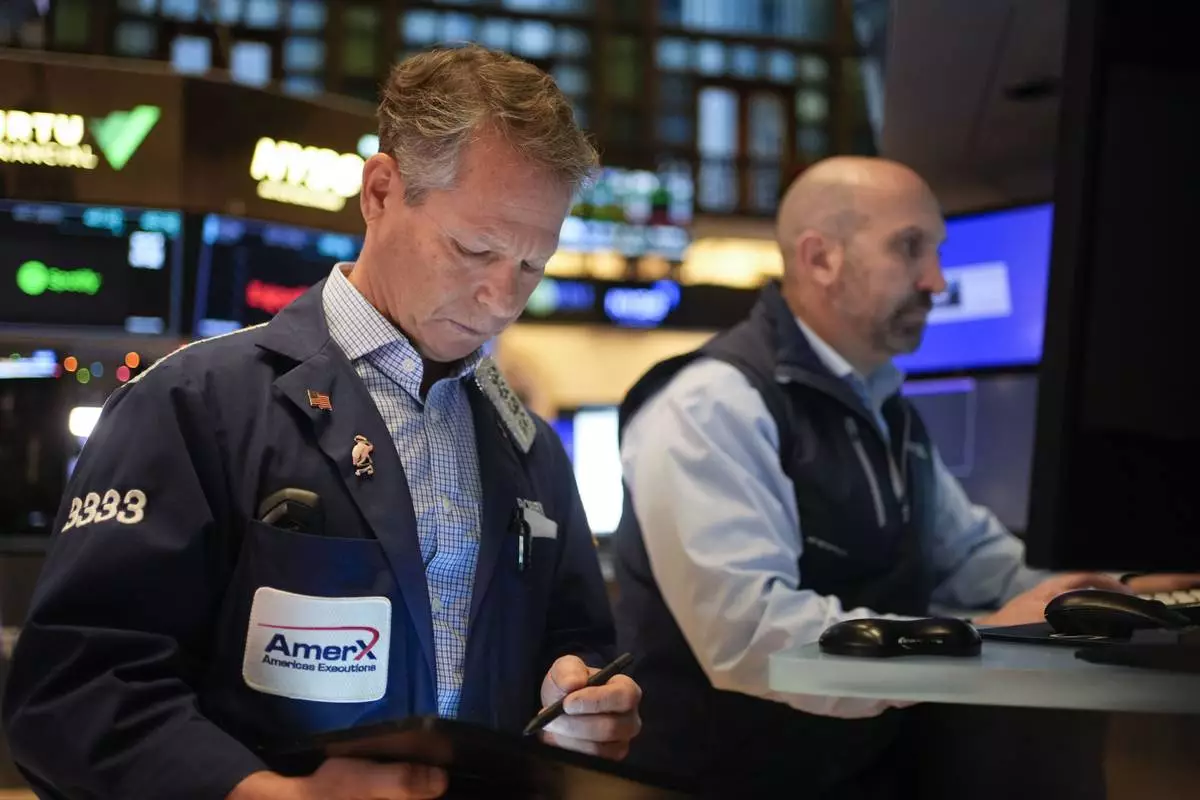
Traders work on the floor at the New York Stock Exchange in New York's Financial District Thursday, Jan. 2, 2025. (AP Photo/Seth Wenig)
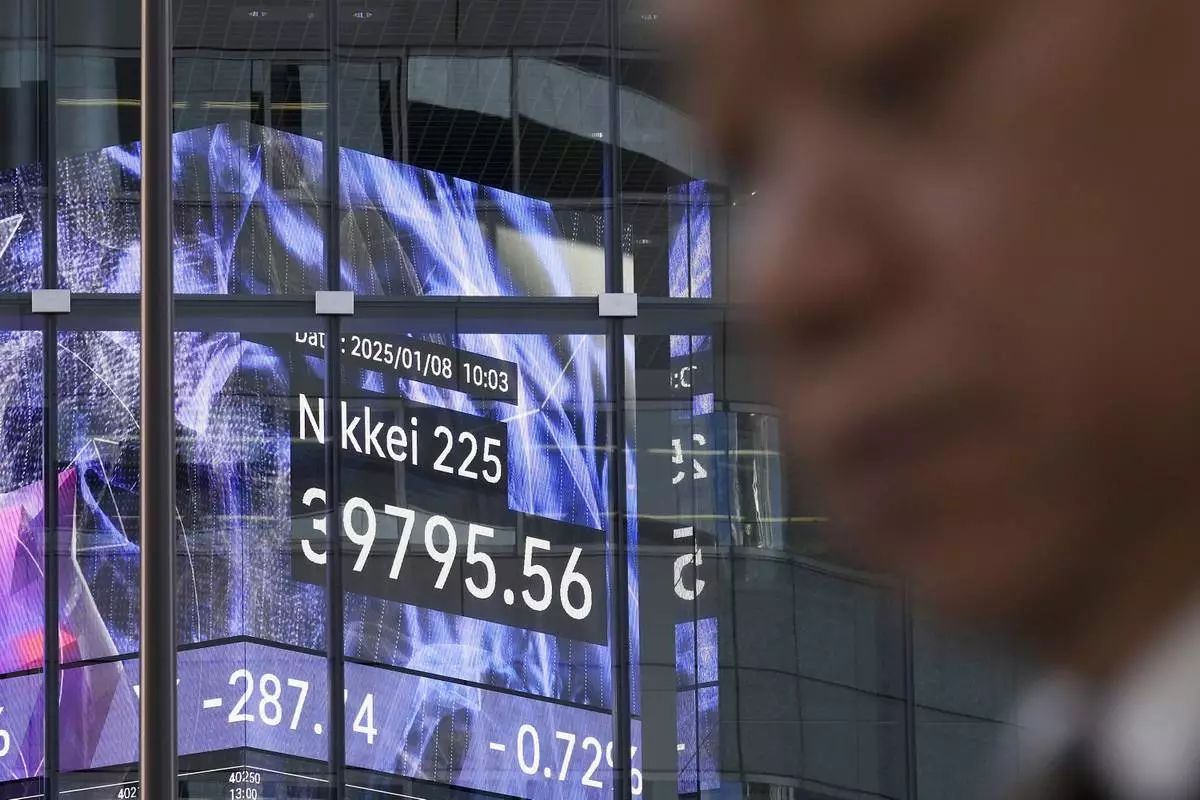
A person walks in front of an electronic stock board showing Japan's Nikkei 225 index at a securities firm Wednesday, Jan. 8, 2025, in Tokyo. (AP Photo/Eugene Hoshiko)
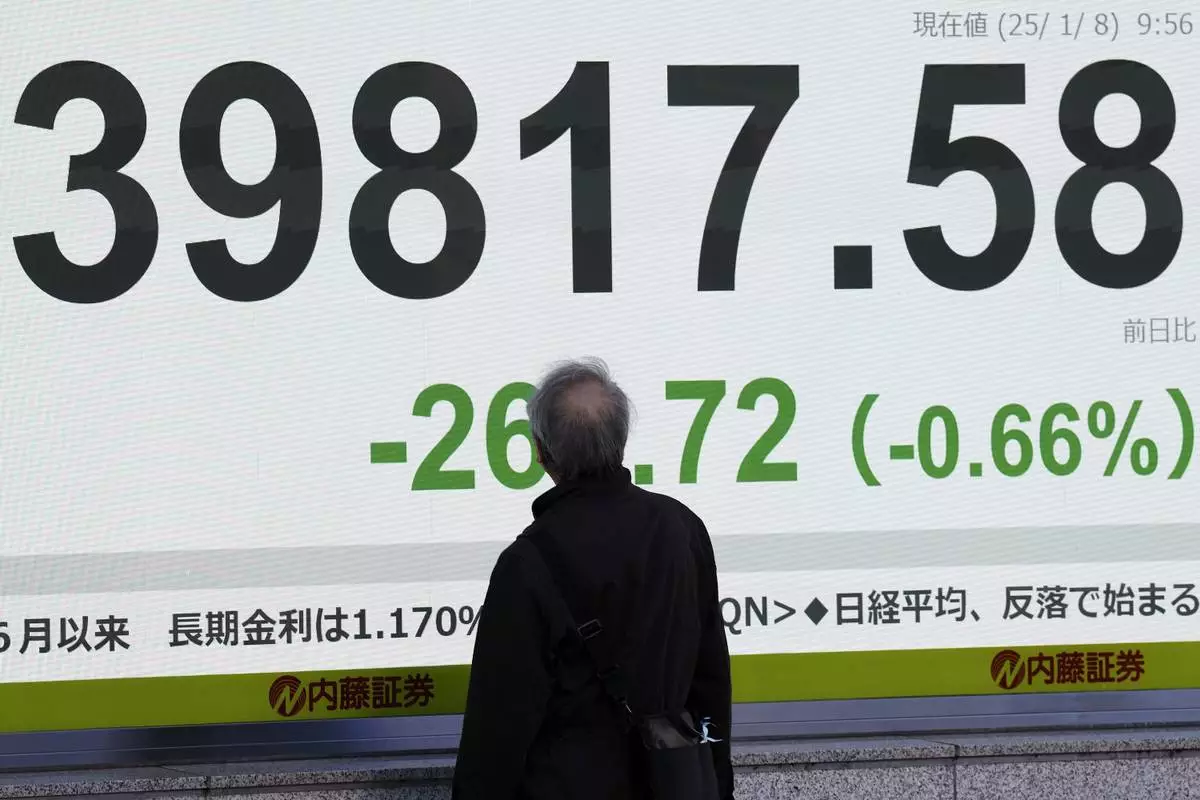
A person looks at an electronic stock board showing Japan's Nikkei index at a securities firm Wednesday, Jan. 8, 2025, in Tokyo. (AP Photo/Eugene Hoshiko)
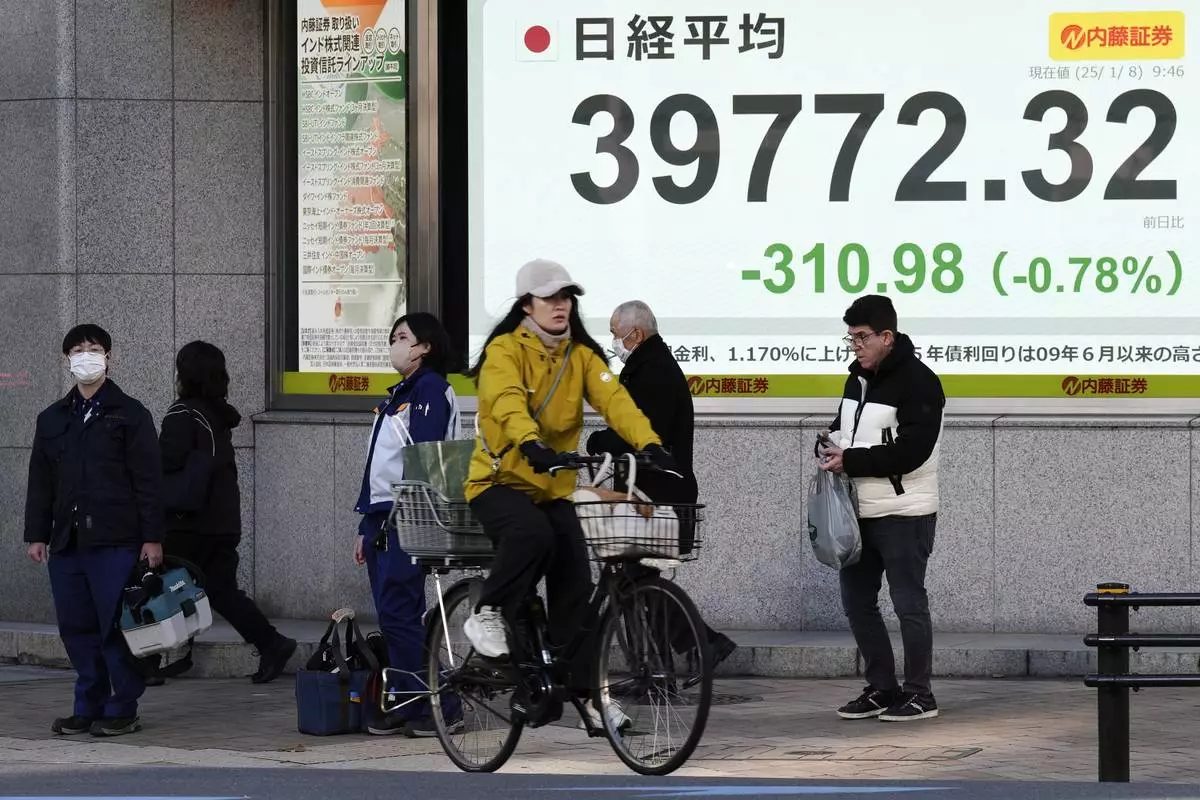
People stand in front of an electronic stock board showing Japan's Nikkei index at a securities firm Wednesday, Jan. 8, 2025, in Tokyo. (AP Photo/Eugene Hoshiko)
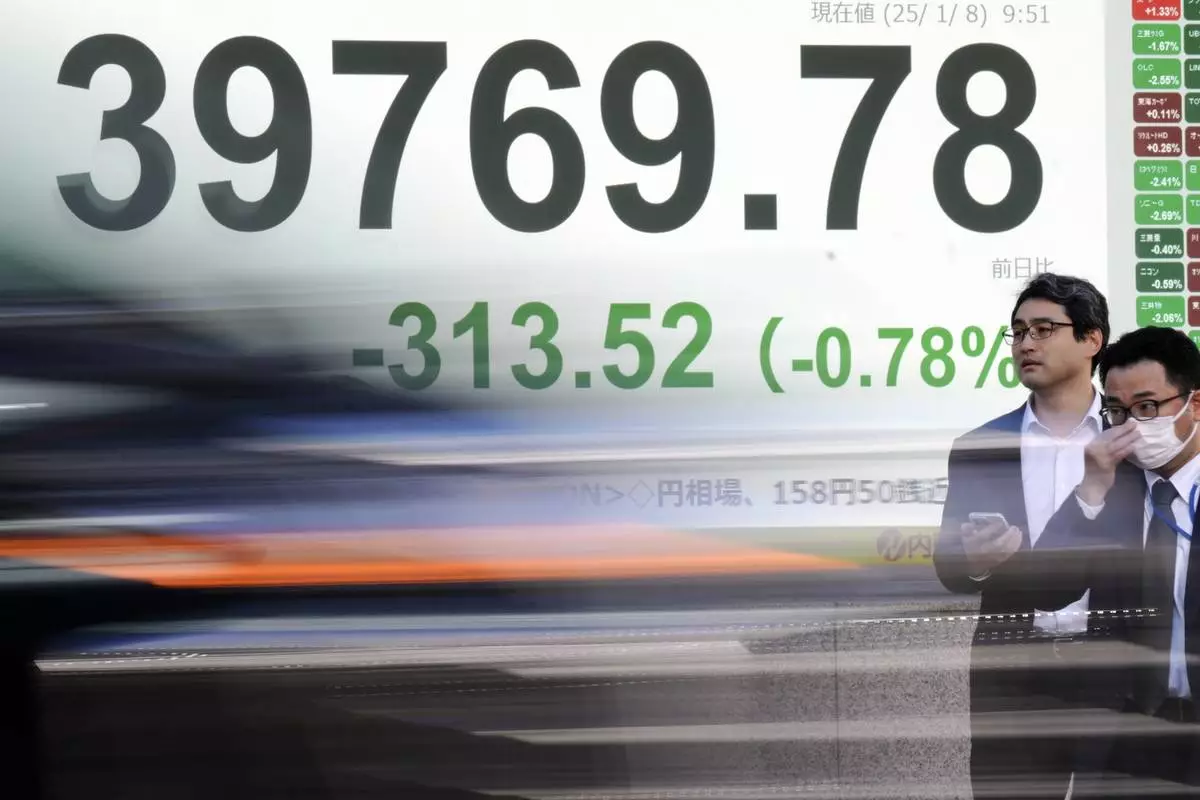
People stand in front of an electronic stock board showing Japan's Nikkei index at a securities firm Wednesday, Jan. 8, 2025, in Tokyo. (AP Photo/Eugene Hoshiko)















